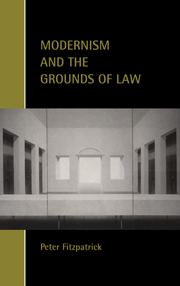2 - Position
Published online by Cambridge University Press: 05 July 2014
Summary
‘Fill ye up then the measure of your fathers.’
(Matthew 23: 32)INVOCATIONS
It may at times help to be as certain as we can be about our uncertainty. The previous chapter opened with an unremarked dissonance. Zizek dramatically advanced the Freud of Totem and Taboo as putting our position in question, yet the myth of the primal parricide recounted there was something ‘that should be a presupposed … if one is to account for the existing social order’ (Zizek 1991a: 208). The Freudian myth was likewise torn between its accounting for the social order as determinant position and its unresolved, restless questioning going ever beyond position. What, hopefully, started to emerge from this engagement with the myth, from the way in which the terms of that unresolved questioning became so insistent, was that these terms may themselves be accounting in some way for the social order. And these were terms which involved law. Yet any foundational assurance this juridical outcome offered was undermined by its constituent reliance on a transgressive savagery which surpassed it.
All of which may not be of extensive interest if it were not for the multitude of claims to the effect that Freud and his story of the anthropophagous parricide provide the mythos of ‘our’ age. If those claims have some cogency, then we would expect that the positioning, if unresolved, terms of the story – terms associated with our origin and identity, with community and the constitution of the social, with transgression and savagery – would be matters of recurrent existential and intellectual concern. That they are so, and how they are, will be the preoccupation of this chapter. More pointedly, since the positioning terms in Freud's seemingly paradigm myth invoke law in their very irresolution, we may expect that, when seen in more abstracted settings outside of the myth, such terms would invoke law there also. And such, mirabile dictu, proves to be the case. At least, that is the purport of this chapter.
- Type
- Chapter
- Information
- Modernism and the Grounds of Law , pp. 37 - 69Publisher: Cambridge University PressPrint publication year: 2001



